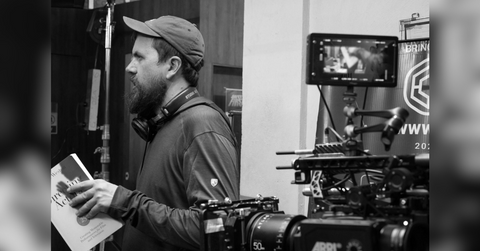 NEWS
NEWSWhy Complex and Dynamic Female Characters in Film Are Imperative Now More Than Ever

PETER ZERZAN
Sept. 11 2025, Published 1:03 a.m. ET
Lately, mainstream cinema has held women on an impossible pedestal. They are often portrayed as flawless and perfect, having an almost mythical ability to glide through life’s challenges without stumbling. While these portrayals may seem aspirational, they have stripped female characters of something essential: authenticity.
Filmmaker Peter Zerzan believes this is more than a missed opportunity. It’s a creative failure. “When female characters are idealized beyond reality, they stop reflecting the audience they’re meant to connect with,” he says. “Cinema holds an incredible power, and that’s the ability to show truth, and truth is never perfect.” Zerzan believes emulating perfection in a world where perfection doesn’t exist exacerbates the disconnect between the audience and a film’s characters.
Zerzan’s, The Tourist, takes a deliberate target at this issue. The film follows Akiko, a Japanese businesswoman attending a crypto convention in Goa, India. Seemingly, she is everything society might deem ‘successful,’ ambitious, career-focused, impeccably presented. But authentically, she’s disillusioned. Burdened by sacrifice and driven by the dangling promise of a promotion. But what she finds is something far more meaningful, the path she truly desires.
For Zerzan, Akiko’s arc reflects a commentary on the real-life pressures women face in professional spaces. “We wanted to reflect the truth that women–especially in business–are often pushed down very narrow paths, where deviation is seen as weakness,” he explains. “The irony is, you can do everything ‘right’ and still end up empty-handed. So why not live the life you actually want?”
Creating such a grounded female lead required more than a male director’s interpretation of a woman’s inner life. From the start, Zerzan knew The Tourist needed a co-writer who could bring a lived female perspective to the story. That collaborator was Melissa Pennel, a published novelist. She came into the project determined to craft a character who was human before she was heroic.

MELISSA PENNEL
Want OK! each day? Sign up here!
“It felt important to show many layers at play for Akiko, layers that are identifiable for many women, regardless of the field,” Pennel says. “She has a real desire to prove herself and define who she is in a male-dominated field. However, it becomes clear that’s not what she actually wanted. It felt important to show the complexity and duality of that journey, chasing between success and authenticity.”
That authenticity extended into the performance itself. Lead actress Miho Saito, who drew on her own lived experiences, found deep personal meaning in the role, and more so, in the location where the shooting took place. “The magic of playing Akiko was inseparable from the experience of shooting in Goa,” Saito shares. “It made me braver in my choices and more open in my performance, because Goa itself demanded honesty, much like Akiko’s journey.”
Zerzan notes that such female leads were very common in major studio productions. “When I was growing up, you didn’t have to look far to find films with female characters who were complex, flawed, and real. But now, too often, women lead roles are written as superheroes. There’s nothing wrong with that, but when that becomes the default, we lose the nuance.”
When audiences repeatedly see women presented only in idealized and flowerpot roles, it subtly reinforces the notion that this is what women should be in real life, lacking any real depth.
That pressure, to be exceptional at all times, is the same pressure that traps Akiko in the film. “When we feel invisible, we chase the things that we believe will help us to be seen,” Pennel says. “Akiko wanted to be seen by her boss as an employee, then she basked in how it felt to be seen by Kevin, but eventually, the undercurrent shifts: to Akiko seeing herself, that’s the vision.”
Through Akiko, The Tourist highlights a universal tendency, one that lives in the desire to be seen. It's this desire that the film overcomes, redefining the narrative. “Movies reflect the culture, but they also shape it,” Zerzan says. “If we keep writing women without flaws, we’re just feeding the same cycle that makes them feel they can’t fail.”
Breaking that loop, he argues, requires collaboration. “One of the best parts of making The Tourist was letting go of the need to be the sole creative voice,” Zerzan says. “Art is stronger when you invite other perspectives into it.”
At its heart, The Tourist is a love letter to imperfection, and a challenge to both filmmakers and audiences to embrace it. Akiko’s journey of transformation throughout the film is not framed as reckless, but as a valid, even necessary, act of self-preservation. Because real women, like real stories, are never perfect. And that’s exactly what makes them worth watching.


